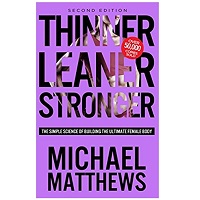Thinner Leaner Stronger by Michael Matthews EPUB & PDF – eBook Details Online
- Status: Available for Free Download
- Authors: Michael Matthews
- Publish Date: January 26, 2015
- Language: English
- Genre: Sports Training
- Format: PDF / EPUB
- Size: 2 MB
- Pages: 350
- Price: Free
THE HIDDEN BARRIER TO ACHIEVING YOUR
FITNESS AND HEALTH GOALS
You may have wondered why so many people are utterly confused on the
subjects of health and fitness. Ask around one day, and you’re liable to receive
all kinds of conflicting, illogical advice and opinions.
Counting calories doesn’t work. Broccoli has more protein than chicken. Any
carbs you eat at night will automatically turn into body fat. If you eat fats, you’ll
get fat (and its corollary: eat little-to-no fat to lose fat). You have to eat a lot of
small meals every day to lose weight.
advertisement ( ads )
--- --- --- --- ---
I’ve actually been told all of these things. Pretty scary, right?
So how does this happen? Why are people so susceptible to false information,
lies, and weird ideas?
While that question might sound like it has a deep, philosophical answer, it’s
pretty simple, really.
The next time you hear someone saying that counting calories isn’t necessary
or doesn’t work, ask them this simple question:
What is a calorie?
One for one, they will just stand there with a confused look on their faces.
They don’t have a clue what the word means. And that’s only the beginning, of
course.
What is a carbohydrate?
What is protein?
What is fat?
What is muscle?
What is a hormone?
What is a vitamin?
What is an amino acid?
Very few people can actually define these words, so of course they can’t
understand the subject and will believe nearly anything they’re told. How can
you gain a full and proper understanding of a subject when you don’t understand
the words used to explain it?
Well, that’s why words are the biggest hidden barrier to understanding that
almost everyone completely overlooks.
Simply put, if you have misunderstandings about the words being used to
communicate specific concepts, you will not duplicate the communications
exactly—you will reach your own distorted conclusions due to misinterpretation.
If I were to tell you, “The children have to leave at crepuscule,” you might
wonder what I am talking about. “Crepuscule” simply means the time of the day
when the sun is just below the horizon, especially the period between sunset and
dark. The sentence now makes sense, doesn’t it?
In school, many of us were taught to simply guess at the meanings of words
by looking at the surrounding context or by comparing the word to other words
in our vocabularies. This is, of course, a very unreliable method of study because
the person writing the text had a specific concept to communicate and chose
exact words based on specific understandings. If you want to receive the
information in the same light, you must share the same understanding of the
words used to convey it, not come to subjective understandings based on what
you think the words might mean.
With “crepuscule” in the example above, context only reveals that the word
must be a time of day, which isn’t enough information to guess the word. Then,
you’re left with looking at the word itself, maybe thinking, “Well, ‘crepescule’
looks like ‘crepes,’ which are often eaten in the morning, so I guess it means
‘after breakfast’?”
For More Read Download This Book
EPUB
advertisement ( ads )
-------------





